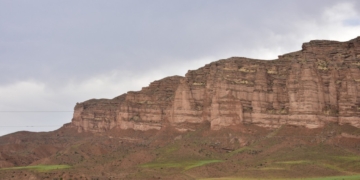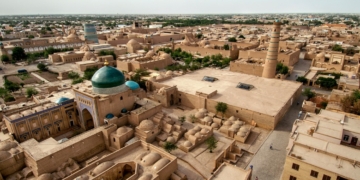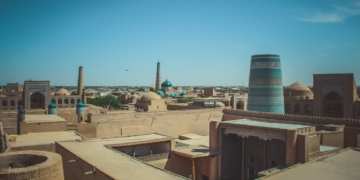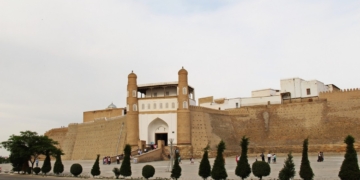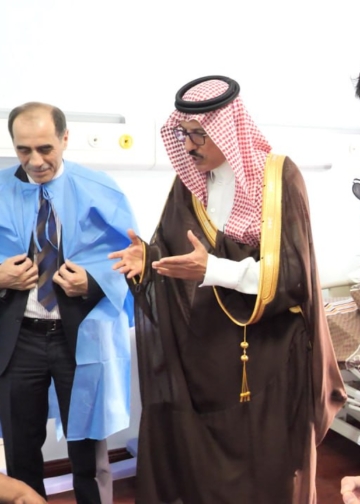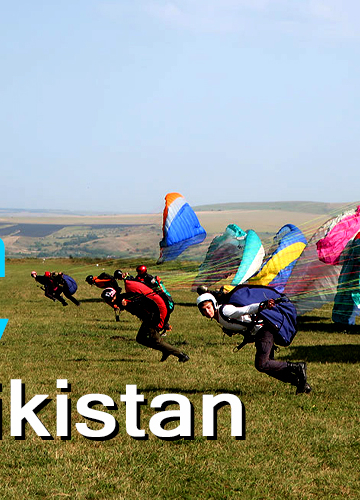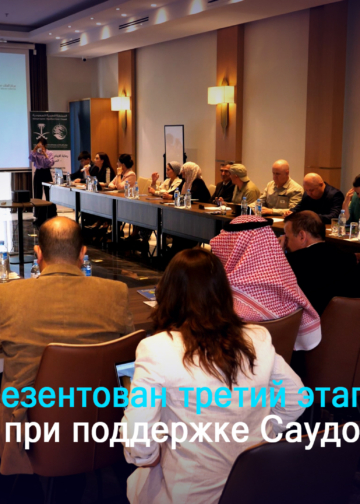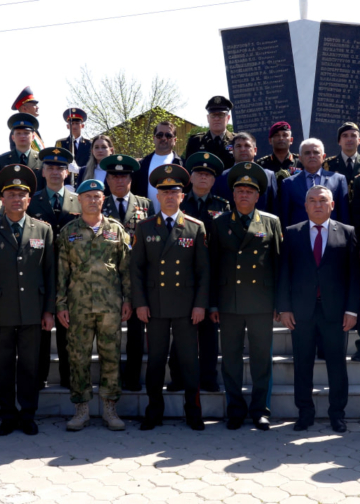id: 46151
date: 11/28/2005 7:02
refid: 05DUSHANBE1870
origin: Embassy Dushanbe
classification: CONFIDENTIAL
destination: 05DUSHANBE1828|05DUSHANBE1855|05DUSHANBE1866
header:
This record is a partial extract of the original cable. The full text of
the original cable is not available.
—————— header ends —————-
C O N F I D E N T I A L DUSHANBE
001870
SIPDIS
STATE FOR P, EUR/CACEN, SA, DRL, S/P
NSC FOR MERKEL
E.O. 12958: DECL: 11/28/2015
TAGS: PGOV, PREL, KISL, KDEM, RS, TI, Internal Politics
SUBJECT: MODERATE TAJIK ISLAMIC LEADER KABIRI WALKS A TIGHTROPE —
RAHMONOV WANTS TO MARGINALIZE HIM; HIS PARTY’S ISLAMIST WING
DISTRUSTS HIM
REF: A) DUSHANBE 1866 B) DUSHANBE
1855 C) DUSHANBE 1828
CLASSIFIED BY: Richard E. Hoagland, Ambassador, EXEC, Embassy
Dushanbe.
REASON: 1.4 (b), (d)
1. (C) SUMMARY: First Deputy Chairman of the Islamic
Renaissance Party of Tajikistan (IRPT) and Member of Parliament,
Muhiddin Kabiri, worries that the government wants to
marginalize him and that his pro-Western views alienate a
significant wing of his party. He
praised Secretary Rice’s
visit to a Dushanbe mosque and madrassa, but lamented the
blackout by Tajik state media of coverage of these events. He
said the Chairman of the Lower House of Parliament ordered him
never again to wear an orange tie (symbol of «color
revolutions»). The Russian
Embassy under its new ambassador has
severed all contact with the IRPT.
He asserted that the current
Tajik leadership, increasingly authoritarian, will not allow
legitimate new leaders to emerge.
The West should carefully
find ways to support Kibiri as a new-generation, moderate
Islamic leader. This would
include giving him greater political
exposure at high levels, not just at the usual international
seminars and conferences. END
SUMMARY
2. (SBU) Muhiddin Kabiri, the
First Deputy Chairman of the
Islamic Renaissance Party of Tajikistan (IRPT), asked for a
November 22 meeting with the Ambassador to discuss his views of
Tajikistan’s political scene since Secretary Rice’s October 13
visit to Dushanbe.
REACTION TO THE SECRETARY’S VISIT
3. (C) Kabiri requested a readout
of the Secretary’s meeting
with President Rahmonov. The
Ambassador assured Kabiri that
Secretary Rice had told Rahmonov that the United States wants to
SIPDIS
see Tajik presidential elections in 2006 that meet international
standards. She explained to
Rahmonov that clean elections don’t
happen just on election day, but, equally important, in the long
run-up when other politicians need access to the media to get
their messages to the people.
4. (C) Noting he had just come
from a state think-tank
roundtable discussion of the U.S. concept of the Central Asian
Corridor of Reform, Kabiri asked whether there was a place in
that corridor for the IRPT. The
Ambassador assured Kabiri
Secretary Rice had specifically praised Tajikistan for having
SIPDIS
the only legal Islamic party in the region taking part in the
political life of the nation. He
told Kabiri one of the key
points of U.S. foreign policy in Central Asia is to find
appropriate ways to support traditional moderate Islam and
leaders and parties that profess that view.
5. (C) Kabiri praised the
Secretary for meeting with
Tajikistan’s political party leaders and especially for visiting
the Central Mosque and Women’s Madrassa.
He added that he and
his party were chagrined that the Tajik state media, including
the all-important television, had blacked out all coverage of
the mosque and madrassa visits.
The Ambassador asked Kabiri to
pass to his party members his apologies that Tajik security
bodies had cleared the neighborhood around the mosque and
madrassa of legitimate worshippers during the Secretary’s visit.
This was especially regrettable
during Ramadan.
TAJIKISTAN’S «MANAGED DEMOCRACY»
6. (C) Kabiri noted that Tajik
officials often talk about
democracy, but in reality find real democracy a threat to their
vide-grip on power, and act to suppress it. He added that the
IRPT itself is not as democratic as it should be, but does what
it can within current political and cultural constraints. For
what has happened to democracy in Tajikistan in recent years,
Kabiri explained the opposition’s potential to use force at the
end of the Civil War motivated the government to cooperate with
all opposition groups and was pluralistic out of weakness. Now,
the ruling political elite sees no credible opposition, armed or
otherwise, and increasingly dismisses any need for continuing
dialogue.
7. (C) The Ambassador pointed out
the Tajik government pays lip
service to democracy and pluralism, but increasingly exerts
greater control over every aspect of political life. This is
neo-Soviet «managed democracy,» not real democracy and,
unfortunately, is encouraged by Moscow.
Kabiri confessed the
IRPT at this point would settle for a sort of managed democracy,
if it at least had some elements of real democracy, but he fears
that the government is becoming increasingly authoritarian.
8. (SBU) Kabiri said he had
published an article in IRPT’s
newspaper, «Najot,» criticizing the U.S. «double standard»
in
which the United States supposedly professes support for
democratic values, but in fact supports authoritarian regimes in
Saudi Arabia, Pakistan, and Uzbekistan.
However, he noted, the
U.S. reaction to the Andijon massacre in Uzbekistan had been an
eye-opener. He praised the United
States for acting on its
ideals. «This did not go
unnoticed,» he said.
9. (C) The Ambassador said
President Rahmonov seems to make
public statements in support of Islam, but also issues
contradictory regulations that undercut this position, like the
recent ban on females wearing «hijab» (Islamic headscarves) in
public schools. Kabiri agreed and
said that such actions are
radicalizing the more conservative wing of his party. He
claimed that general support for the IRPT in the traditional and
conservative parts of Tajik society had surged following this
ill-considered edict.
TOE THE LINE — AND GET RID OF THE ORANGE TIE
10. (C) The IRPT and the
Communist Party of Tajikistan (CPT)
are the only minority parties in Parliament. Kabiri recounted
that Chairman of the Lower House of Parliament Khairulloyev had
told him that he (Khairulloyev) is responsible for keeping
Kabiri and CPT Chairman Shodi Shabdalov in line — and he doesn’t
have to worry about Shabdalov.
11. (C) Kabiri recounted that he
had recently, by chance, worn
an orange necktie to a session of parliament. Khairulloyev had
pulled him aside and ordered him never to wear it again in
public. Kabiri laughed and said
he had not intended to make a
political statement in support of «color revolutions.» He
simply has bad taste and lets his wife every morning pick out
which tie he wears.
12. (C) More seriously, Kabiri
said his primary goal as an
«opposition politician» is to stay out of prison. Although he
speaks out in IRPT press releases and in the party newspaper, he
trims his sails in parliament and generally votes with the
government. As a result, he has
the worst of both worlds. The
government, he said, sees him as a dangerous radical, and the
more conservative wing of his party sees him as a pro-Rahmonov
lackey.
13. (C) COMMENT: Although Rahmonov sees the IRPT as a
dangerous enemy and tells some Western interlocutors it’s a
terrorist organization, he also wants to keep the IRPT in the
Big Tent, if he feels he can control it.
IRPT Chairman Said
Abdullo Nuri, dying of cancer, is one of the civil war warlords
whom Rahmonov has allowed to become very wealthy. In the world
of Tajik politics, that gives Rahmonov control over Nuri.
Rahmonov has no such relationship with Kabiri, and is greatly
annoyed that he seems to be well received in Western embassies
and capitals. Rahomonov does not
want to see Kabiri succeed
Nuri as IRPT chairman, although the general consensus at this
time is that Kabiri is essentially Chairman-in-Waiting until
Nuri dies. END COMMENT.
RAHMONOV BUILDS NEW FACADE OF SUPPORT
14. (C) The Ambassador asked
Kabiri for his opinion of the two
newly registered parties — the Party of Economic Reform and the
Agrarian Party of Tajikistan and why they have appeared now on
the political scene (reftels A, B).
Kabiri responded that the
parties are a calculated political creation by Rahmonov to give
the illusion that he has multi-party support and to bolster his
claim to «democratic» legitimacy at the same time that he
works
to marginalize the other real opposition parties.
15. (C) However, Kabiri conceded,
even if the new parties are
artificial, he welcomes them because the more political parties
on the scene, the better. They
may mutate toward a degree of
independence, and in the longer term multiple parties will be
able to form various coalitions.
(COMMENT: If in fact this is
Kabiri’s view, it’s both generous and naove. Should these new
parties not toe Rahmonov’s line, they will not continue to
exist. END COMMENT.)
NEW-GENERATION POLITICIANS CANNOT EMERGE
16. (C) The Ambassador asked
Kabiri who are the new
politicians-in-waiting who could emerge on the national scene —
who are making names for themselves and building constituencies,
even at the regional and local levels?
Who are the bright young
leaders we should pay attention to?
Kabiri had no optimistic
answer. He said that the
«big names» from the civil war and
post-civil-war period have been co-opted, are now in prison, or
are simply shallow non-entities.
He suggested someone like
Social Democratic Party of Tajikistan Chairman Zoyirov (reftel
C) is a real leader with national potential, but no one knows
him broadly nationwide. If he
could appear on State TV «five
times in the next year,» he’d have a real constituency. But
this will not happen because Rahmonov will not allow it.
RUSSIAN EMBASSY NOW A «BLACK HOLE»
17. (C) The Ambassador asked
Kabiri if he and his party
maintain normal contacts at the Russian Embassy. Kabiri said
that under previous Russian Ambassador Peshkov, he and his party
had «correct» contacts with Peshkov and several other Russian
Embassy officials. Since the
arrival this summer of Ambassador
Abdulatipov, the Russian Embassy has become a «black hole» for
the IRPT. No senior IRPT official
has met with Abdulatipov, and
the Russian Embassy has cut off all contact with the party.
Kabiri commented that he is grateful he continues to have access
to the U.S. Embassy.
18. (C) COMMENT: Rahmonov portrays himself in public
statements as the defender of Islam.
At the same time, he is
working to marginalize the IRPT.
Kabiri appears genuinely to be
moderate and to understand Western-style democratic politics.
For this reason, he is controversial within his party, which has
its base of support in the conservative rural sections of the
country. He may emerge as the
next IRPT chairman when Nuri
dies, but this is not a given.
Rahmonov and his minions will
work to marginalize Kabiri in national politics, and the
conservative wing of the IRPT may reject him. In the meantime,
the West should carefully find ways to support Kabiri as a
new-generation, moderate Islamic leader.
This would include
giving him greater political exposure at high levels, not just
at the usual international seminars and conferences . END
COMMENT.
HOAGLAND
NNNN
=======================CABLE ENDS============================
id: 46377
date: 11/30/2005 9:25
refid: 05DUSHANBE1878
origin: Embassy Dushanbe
classification: UNCLASSIFIED
destination:
header:
This record is a partial extract of the original cable. The full text of
the original cable is not available.
—————— header ends —————-
UNCLAS DUSHANBE 001878
SIPDIS
E.O. 12958: N/A
TAGS: PGOV, ECON, EAGR, TI, Economics and Trade
SUBJECT: EVERYTHING’S COMING UP COTTON IN TURSONZODA, TAJIKISTAN
1. In a series of meetings
November 25, government officials,
farmers and a businessman were universally—and surprisingly—
positive about the economic and political situation in
Tursonzoda. The
Dushanbe-appointed Chairman of the City
Administration Barakatullo Akhmedov emphasized there were «no
real problems» in the city or district, and demurred to discuss
all but the most benign issues.
2. Located 53 kilometers west of
Dushanbe, Tursonzoda does
enjoy higher rates of employment and consistent electricity,
unlike many other Tajik cities, thanks to Central Asia’s only
aluminum smelter, TadAZ. TadAZ is
a cash cow that the
government makes sure has sufficient power, with a nice
spillover effect for Tursonzoda.
Akhmedov told Poloff 90
percent of district homes have running water (despite Poloff
observing people carrying water buckets in the streets.)
Although nationally, Tajikistan’s cotton harvest appears to be
well below anticipated yields, in Tursonzoda, Akhmedov claimed
they reached at least 90 percent of the expected harvest.
Residents from three border districts freely enter and exit
Uzbekistan with no problems. The
central government provides
Tursonzoda with adequate funds for schools. «We are
normalizing,» Akhmedov noted.
«Tajikistan is a young democracy,
but look how fast we are catching up!» He cited the
proliferation of mobile phones and the thriving small markets as
examples of economic progress.
3. (COMMENT: Local Embassy staff
noted that Tursonzoda is
actually considered a good place to live, after Dushanbe,
particularly because the television from Uzbekistan is a
higher-quality, albeit another state-supported propaganda
machine. END COMMENT.)
4. In a separate meeting,
Turgunali Abdulloyev, chief of
Abdurahmonov farm, gave an upbeat assessment of Tursonzoda’s
agricultural situation. Despite
the presence of heavy industry,
district farmers traditionally enjoyed higher yields due to
better soil and climate. In
Soviet times Tursonzoda produced
many «heroes of agriculture.»
Unlike in most cotton-growing
regions, Abdulloyev alleged farmers carry very little debt. The
government did not pressure farmers to grow cotton, but cotton
proved more profitable than other crops.
«There is no market
for other things,» he noted.
5. Abdulloyev echoed Akhmedov’s
claims that most of the region
had running water, electricity and paved roads. Because of the
smelter and strong agriculture base, fewer district residents
worked in Russia; in fact, workers from other parts of
Tajikistan came to Tursonzoda for temporary work. (NOTE:
TadAZ
is estimated to employ 13,000 workers, in a city of around
60,000. END NOTE.)
6. Abdurakhim Rakhimov, owner of
a privatized porcelain
factory, observed that while his outfit produced only for the
domestic market, few porcelain factories in the world are
profitable these days. He
described the business climate in
Tursonzoda as encouraging.
Cheaper, better quality porcelain
from neighboring China was beginning to push his products out of
the market, but he thought he could turn a profit by changing
production from tea sets to isolators for power stations. Trade
with Afghanistan offered possibilities, but 70-90% import taxes
prevented commerce with Uzbekistan from growing beyond the small
traders carrying things to local markets on either side of the
border.
7. Rakhimov’s factory still
carried debt from the privatization
processes. His single complaint
focused on the high taxes in
Tajikistan and other CIS countries.
«Too high for such weak
economies,» he sighed.
Corruption was not a problem, he
maintained. Oh really? pressed
Poloff. The government had done
a lot for stability, he argued, and Tajikistan had no issues
with corruption.
PASS THE KOOLAID-WE’LL HAVE SOME, TOO
8. COMMENT: Even the most nationalistic pro-government
Tajik
citizen will usually acknowledge some problems, or express
frustration with the slow economic growth. Corruption is always
a favorite topic, schools always need more funds and mentioning
Uzbekistan can usually stir some sort of response in the most
sanguine. The Stepford-like
responses during all three meetings
in Tursonzoda were puzzling.
Tajik officials, even in the worst
parts of the country, feel it their duty to tell EmbOffs that
all is rosy. What was unique was
the same comments from
business and agriculture. END
COMMENT.
HOAGLAND
NNNN
=======================CABLE ENDS============================
id: 46404
date: 11/30/2005 13:06
refid: 05DUSHANBE1898
origin: Embassy Dushanbe
classification: UNCLASSIFIED
destination:
header:
This record is a partial extract of the original cable. The full text of
the original cable is not available.
—————— header ends —————-
UNCLAS DUSHANBE 001898
SIPDIS
STATE FOR EUR/CACEN, EUR/PPD, SA, S/P
NSC FOR MERKEL
E.O. 12958: N/A
TAGS: PREL, PGOV, ECON, EAID, MARR, KDEM, TI, Economics and Trade,
Hydropower and Energy, Border issues, Narcotics
SUBJECT: AMBASSADOR SPEAKS ON CURRENT STATUS AND FUTURE OF
U.S.-TAJIKISTAN RELATIONS
1. At the invitation of the
Central Executive Committee of the
People’s Democratic Party of Tajikistan (PDPT, ruling party), on
November 30 in Dushanbe the ambassador spoke to an overflow
crowd of college students, members of parliament, NGO
representatives, PDPT activists, and journalists on «The Current
Status and Future of U.S.-Tajikistan Relations. Text of the
speech follows in para two.
2. BEGIN TEXT:
Thank you for the opportunity to meet with members of
parliament, officials from the President’s Administration, the
Youth Committee of the Government of the Republic of Tajikistan,
People’s Democratic Party of Tajikistan activists, NGO
representatives, and journalists.
I am very pleased that you
asked me to discuss U.S.-Tajik relations.
This is especially timely because the U.S. Government has
recently completed a comprehensive review of its relations with
all the countries of Central Asia.
In broadest terms, we
reaffirmed that U.S. interests are 1) political and economic
reform, 2) security (including against terrorism, extremism, and
narcotics), and 3) energy and commercial. The purpose of all
three equally together is to promote long-term stability, good
neighborly regional cooperation, and prosperity.
ENERGY AND COMMERCE
Let’s look at each of these three for Tajikistan, starting with
energy and commerce. In recent
years, President Emomali
Rahmonov has advocated a convincing plan to develop
hydroelectric power and to improve land transportation routes
for the region. We have listened
to his views, and we agree
with him.
During her October visit to Central Asia, Secretary of State
Condoleezza Rice announced the Infrastructure Integration
Initiative for Greater Central Asia, including Afghanistan. I
think few in the region paid much attention to this, but it is a
very significant development. We
want to see an improved system
of roads and highways that will allow goods to transit the
region efficiently and reach international markets via
warm-water ports in the south. To
that end, we are helping to
rebuild the highways in Afghanistan, and we are using our
influence in International Financial Institutions to support
road projects in Central Asia, and specifically in Tajikistan.
A most recent example is U.S. support for the Asian Development
Bank loan to rebuild the road from Dushanbe to Kyrgyzstan
through the Rasht Valley. If the
farmers in Rasht can once
again get their magnificent fruit and other agricultural
products to markets far beyond their villages, prosperity will
return to that region.
And of course by now you are familiar with the U.S. gift of
about $30 million and the technical expertise to build an
international bridge between Tajikistan and Afghanistan, as well
as the customs and border-control points at both ends of the
bridge. When we say we will do
something, we do it.
We also see the value of developing Tajikistan’s considerable
hydroelectric potential for use in Tajikistan and to sell more
broadly in the region. This will
take more than finishing
several major dams and hydroelectric stations. Electricity
transmission lines and complex international marketing systems
need to be established. Both your
Ambassador Homrahon Zaripov
in Washington and I have strongly promoted this project in
Washington.
I am very pleased that a major U.S. corporation with worldwide
business interests is negotiating closely with Russia’s RAO UES
to help President Rahmonov’s vision become reality. Further,
U.S. Government commercial and financial departments are
increasingly involved and want to see this project reach
fruition. We understand that
achieving this goal will enhance
stability and promote long-term prosperity for the entire
region. Some do not want U.S.
participation in this project,
but it would be a good guarantee for Tajikistan’s economic
sovereignty in the global economy.
SECURITY
The U.S.-Tajikistan security relationship is consistently
growing. In recent months,
Tajikistan has joined the nearly 90
nations around the world that support the Proliferation Security
Initiative to prevent the illegal trans-shipment of weapons of
mass destruction, their components, and missile technologies.
Also, Tajikistan is starting the process that will lead to a
Weapons of Mass Destruction Agreement between our two countries
and will open the door for significant new security-assistance
programs. These are just the
latest developments.
We take seriously our partnership to enhance border security and
counter-narcotics programs in Tajikistan. In the U.S. fiscal
year 2005, we have allocated about $33 million dollars for these
essential activities — a truly significant increase above
previous years’ funding.
Some like to complain and blame Tajikistan for the narcotics
transiting its territory. We, the
United States, are doing
something about it. It is no
secret that it is largely U.S.
funding that is responsible for Tajikistan’s Drug Control Agency
having gained international praise for its professionalism and
effectiveness. And, of course, it
is thanks to the serious
Tajik patriots, the men and women who work honestly every day to
make the Drug Control Agency a success.
Our support continues,
and soon the U.S. Drug Enforcement Agency will open an office in
Dushanbe to further enhance anti-narcotics cooperation between
our two countries, with Afghanistan, and internationally. We
want to work closely with Russia on this issue.
In response to Tajikistan’s request, we are working closely with
the State Committee for Border Protection and providing both
material assistance and training, in cooperation with the
European Commission, to increase Tajikistan’s ability to protect
its own boarders. This is
necessary not only for regional
security, but also to promote Tajikistan’s sovereignty.
Finally, without going into detail, we have new
counter-terrorism programs with Tajikistan that, in the longer
term, will increase security and stability in the region.
POLITICAL AND ECONOMIC REFORM
Let’s start with economic reform.
As I have done before, I will again praise the Government of
Tajikistan for the credible steps it has taken toward economic
and financial reform. These
include banking reform, tax reform,
simplified regulations to make it easier to register a new
business, and positive steps to prepare to join the World Trade
Organization.
But good laws and regulations aren’t very useful if they are not
implemented fairly and honestly.
More than anything else,
corruption and protection of special interests — which are often
one and the same thing — will impede economic development.
Do you know what especially annoys small business owners in
Tajikistan? The constant,
irrational parade of tax inspectors,
health inspectors, fire inspectors, and, who knows, probably
even inspectors of inspectors — all who have their hands out and
their pockets open. This is more
than annoying; it’s
destructive.
A general manager of a successful medium-sized business in
Dushanbe recently told me his company lost nearly 40 days last
year to dealing with so-called inspectors. This is 40 days of
lost productivity. This is 40
days of lost profit and lost
legitimate tax base for the central government’s budget.
Now for political reform. Let me
see if I can find a new way to
explain our views so that I don’t sound like a «revolutionary
Bolshevik» seeking to overthrow an old system and impose a new
ideology — because we honestly seek democratic evolution, not
«color revolution.» We
want the current government to succeed
according to modern international standards.
Let me say plainly and clearly that we are not seeking to drag
countries away from one sphere of influence into another one.
That’s a very old-guard way of thinking.
It is a discredited
ideology. In the 19th century,
the world saw the Great Game
between the British and Russian Empires in Greater Central Asia.
In the 20th century, the world
saw the Cold War between the
Soviet Union and the West. This
is now the 21st century, and
times have changed. To divide
modern international relations
into different «spheres of influence» is to live in a supposed
«paradise lost» and is historically doomed to failure.
In the contemporary world, countries should decide first and
foremost what is in their own national interests. What will
make them truly stable and prosperous?
What will give their
populations hope for the future?
And I have to say it’s not
holding Big Brother’s hand every time you want to cross the
street.
I fully understand Tajikistan seeks stability above all else
because of the traumatic memories of the civil war. But please
consider this stark fact — 50 percent of the population of
Tajikistan is under 16 years of age.
What will happen in five
years, in ten years, when those children come of age without
personal memories of the civil war?
Isn’t it better to prepare
a future for them that will guarantee them an economic and
political place in society so that they don’t have to rebel to
demand it? Isn’t that the essence
of true, long-term stability?
We firmly believe that you prepare the next generation by giving
them the opportunities to become responsible citizens and to
think for themselves. Not
everyone who has an opinion different
from the official opinion is «an enemy.» Young leaders need to
build their experience and gain confidence. They need access to
a broad range of ideas. They need
independent media — including
independent television and radio stations — where they can
debate each other and test their ideas.
I assure you, this will
not endanger the stability of the state.
On the contrary, it
will strengthen it. These young
people need to enter politics
to bring fresh blood and new ideas into the system, rather than
be «permitted» to enter politics only after they have proved
their loyalty to the existing system.
Tajikistan is strong enough that it can afford new voices with
new ideas. Tajikistan is strong
enough that it can open its
mass media to «the marketplace of new ideas» and new opinions.
We recommend that Tajikistan trust the natural intelligence and
patriotism of the Tajik people.
If this happens, Tajikistan
will blossom as an island of stability and prosperity and stand
as a bright beacon of hope for other less free peoples in the
world.
I wish you luck. I wish you
strength. I wish you success.
Thank you so much for listening to me.
I now would like to hear
your views and answer your questions.
END TEXT.
HOAGLAND
NNNN
=======================CABLE ENDS============================
id: 46403
date: 11/30/2005 13:06
refid: 05DUSHANBE1897
origin: Embassy Dushanbe
classification: UNCLASSIFIED
destination:
header:
This record is a partial extract of the original cable. The full text of
the original cable is not available.
—————— header ends —————-
UNCLAS DUSHANBE 001897
SIPDIS
STATE FOR EUR/CACEN, EUR/PPD, SA, S/P
NSC FOR MERKEL
E.O. 12958: N/A
TAGS: PREL, PGOV, ECON, EAID, MARR, KDEM, TI, Border issues, Economics
and Trade, Hydropower and Energy, Narcotics
SUBJECT: AMBASSADOR SPEAKS ON CURRENT STATUS AND FUTURE OF
U.S.-TAJIKISTAN RELATIONS
1. At the invitation of the
Central Executive Committee of the
People’s Democratic Party of Tajikistan (PDPT, ruling party), on
November 30 in Dushanbe the ambassador spoke to an overflow
crowd of college students, members of parliament, NGO
representatives, PDPT activists, and journalists on «The Current
Status and Future of U.S.-Tajikistan Relations. Text of the
speech follows in para two.
2. BEGIN TEXT:
Thank you for the opportunity to meet with members of
parliament, officials from the President’s Administration, the
Youth Committee of the Government of the Republic of Tajikistan,
People’s Democratic Party of Tajikistan activists, NGO
representatives, and journalists.
I am very pleased that you
asked me to discuss U.S.-Tajik relations.
This is especially timely because the U.S. Government has
recently completed a comprehensive review of its relations with
all the countries of Central Asia.
In broadest terms, we
reaffirmed that U.S. interests are 1) political and economic
reform, 2) security (including against terrorism, extremism, and
narcotics), and 3) energy and commercial. The purpose of all
three equally together is to promote long-term stability, good
neighborly regional cooperation, and prosperity.
ENERGY AND COMMERCE
Let’s look at each of these three for Tajikistan, starting with
energy and commerce. In recent
years, President Emomali
Rahmonov has advocated a convincing plan to develop
hydroelectric power and to improve land transportation routes
for the region. We have listened
to his views, and we agree
with him.
During her October visit to Central Asia, Secretary of State
Condoleezza Rice announced the Infrastructure Integration
Initiative for Greater Central Asia, including Afghanistan. I
think few in the region paid much attention to this, but it is a
very significant development. We
want to see an improved system
of roads and highways that will allow goods to transit the
region efficiently and reach international markets via
warm-water ports in the south. To
that end, we are helping to
rebuild the highways in Afghanistan, and we are using our
influence in International Financial Institutions to support
road projects in Central Asia, and specifically in Tajikistan.
A most recent example is U.S. support for the Asian Development
Bank loan to rebuild the road from Dushanbe to Kyrgyzstan
through the Rasht Valley. If the
farmers in Rasht can once
again get their magnificent fruit and other agricultural
products to markets far beyond their villages, prosperity will
return to that region.
And of course by now you are familiar with the U.S. gift of
about $30 million and the technical expertise to build an
international bridge between Tajikistan and Afghanistan, as well
as the customs and border-control points at both ends of the
bridge. When we say we will do
something, we do it.
We also see the value of developing Tajikistan’s considerable
hydroelectric potential for use in Tajikistan and to sell more
broadly in the region. This will
take more than finishing
several major dams and hydroelectric stations. Electricity
transmission lines and complex international marketing systems
need to be established. Both your
Ambassador Homrahon Zaripov
in Washington and I have strongly promoted this project in
Washington.
I am very pleased that a major U.S. corporation with worldwide
business interests is negotiating closely with Russia’s RAO UES
to help President Rahmonov’s vision become reality. Further,
U.S. Government commercial and financial departments are
increasingly involved and want to see this project reach
fruition. We understand that
achieving this goal will enhance
stability and promote long-term prosperity for the entire
region. Some do not want U.S.
participation in this project,
but it would be a good guarantee for Tajikistan’s economic
sovereignty in the global economy.
SECURITY
The U.S.-Tajikistan security relationship is consistently
growing. In recent months,
Tajikistan has joined the nearly 90
nations around the world that support the Proliferation Security
Initiative to prevent the illegal trans-shipment of weapons of
mass destruction, their components, and missile technologies.
Also, Tajikistan is starting the process that will lead to a
Weapons of Mass Destruction Agreement between our two countries
and will open the door for significant new security-assistance
programs. These are just the
latest developments.
We take seriously our partnership to enhance border security and
counter-narcotics programs in Tajikistan. In the U.S. fiscal
year 2005, we have allocated about $33 million dollars for these
essential activities — a truly significant increase above
previous years’ funding.
Some like to complain and blame Tajikistan for the narcotics
transiting its territory. We, the
United States, are doing
something about it. It is no
secret that it is largely U.S.
funding that is responsible for Tajikistan’s Drug Control Agency
having gained international praise for its professionalism and
effectiveness. And, of course, it
is thanks to the serious
Tajik patriots, the men and women who work honestly every day to
make the Drug Control Agency a success.
Our support continues,
and soon the U.S. Drug Enforcement Agency will open an office in
Dushanbe to further enhance anti-narcotics cooperation between
our two countries, with Afghanistan, and internationally. We
want to work closely with Russia on this issue.
In response to Tajikistan’s request, we are working closely with
the State Committee for Border Protection and providing both
material assistance and training, in cooperation with the
European Commission, to increase Tajikistan’s ability to protect
its own boarders. This is
necessary not only for regional
security, but also to promote Tajikistan’s sovereignty.
Finally, without going into detail, we have new
counter-terrorism programs with Tajikistan that, in the longer
term, will increase security and stability in the region.
POLITICAL AND ECONOMIC REFORM
Let’s start with economic reform.
As I have done before, I will again praise the Government of
Tajikistan for the credible steps it has taken toward economic
and financial reform. These
include banking reform, tax reform,
simplified regulations to make it easier to register a new
business, and positive steps to prepare to join the World Trade
Organization.
But good laws and regulations aren’t very useful if they are not
implemented fairly and honestly.
More than anything else,
corruption and protection of special interests — which are often
one and the same thing — will impede economic development.
Do you know what especially annoys small business owners in
Tajikistan? The constant,
irrational parade of tax inspectors,
health inspectors, fire inspectors, and, who knows, probably
even inspectors of inspectors — all who have their hands out and
their pockets open. This is more
than annoying; it’s
destructive.
A general manager of a successful medium-sized business in
Dushanbe recently told me his company lost nearly 40 days last
year to dealing with so-called inspectors. This is 40 days of
lost productivity. This is 40
days of lost profit and lost
legitimate tax base for the central government’s budget.
Now for political reform. Let me
see if I can find a new way to
explain our views so that I don’t sound like a «revolutionary
Bolshevik» seeking to overthrow an old system and impose a new
ideology — because we honestly seek democratic evolution, not
«color revolution.» We
want the current government to succeed
according to modern international standards.
Let me say plainly and clearly that we are not seeking to drag
countries away from one sphere of influence into another one.
That’s a very old-guard way of thinking.
It is a discredited
ideology. In the 19th century,
the world saw the Great Game
between the British and Russian Empires in Greater Central Asia.
In the 20th century, the world
saw the Cold War between the
Soviet Union and the West. This
is now the 21st century, and
times have changed. To divide
modern international relations
into different «spheres of influence» is to live in a supposed
«paradise lost» and is historically doomed to failure.
In the contemporary world, countries should decide first and
foremost what is in their own national interests. What will
make them truly stable and prosperous?
What will give their
populations hope for the future?
And I have to say it’s not
holding Big Brother’s hand every time you want to cross the
street.
I fully understand Tajikistan seeks stability above all else
because of the traumatic memories of the civil war. But please
consider this stark fact — 50 percent of the population of
Tajikistan is under 16 years of age.
What will happen in five
years, in ten years, when those children come of age without
personal memories of the civil war?
Isn’t it better to prepare
a future for them that will guarantee them an economic and
political place in society so that they don’t have to rebel to
demand it? Isn’t that the essence
of true, long-term stability?
We firmly believe that you prepare the next generation by giving
them the opportunities to become responsible citizens and to
think for themselves. Not
everyone who has an opinion different
from the official opinion is «an enemy.» Young leaders need to
build their experience and gain confidence. They need access to
a broad range of ideas. They need
independent media — including
independent television and radio stations — where they can
debate each other and test their ideas.
I assure you, this will
not endanger the stability of the state.
On the contrary, it
will strengthen it. These young
people need to enter politics
to bring fresh blood and new ideas into the system, rather than
be «permitted» to enter politics only after they have proved
their loyalty to the existing system.
Tajikistan is strong enough that it can afford new voices with
new ideas. Tajikistan is strong
enough that it can open its
mass media to «the marketplace of new ideas» and new opinions.
We recommend that Tajikistan trust the natural intelligence and
patriotism of the Tajik people.
If this happens, Tajikistan
will blossom as an island of stability and prosperity and stand
as a bright beacon of hope for other less free peoples in the
world.
I wish you luck. I wish you
strength. I wish you success.
Thank you so much for listening to me.
I now would like to hear
your views and answer your questions.
END TEXT.
HOAGLAND
NNNN
=======================CABLE ENDS============================
id: 46612
date: 12/2/2005 10:29
refid: 05DUSHANBE1921
origin: Embassy Dushanbe
classification: SECRET
destination: 05STATE214783
header:
This record is a partial extract of the original cable. The full text of
the original cable is not available.
—————— header ends —————-
S E C R E T DUSHANBE 001921
SIPDIS
STATE FOR P, EUR/CACEN, EUR/RUS, SA, S/P
NSC FOR MERKEL
E.O. 12958: DECL: 12/2/2015
TAGS: PREL, PGOV, PINR, MARR, RS, TI
SUBJECT: MEETING WITH PRESIDENT RAHMONOV: HIS VIEWS ON RUSSIA
REF: STATE 214783
CLASSIFIED BY: Richard E. Hoagland, Ambassador, EXEC, Embassy
Dushanbe.
REASON: 1.4 (b), (d)
1. (C) The Ambassador met with
President Emomali Rahmonov on
December 1 for two and a half hours.
We report the meeting in
three cables. This is two of
three. The other two cover
Rahmonov’s views on (1) the U.S.-Tajikistan bilateral
relationship and Tajik politics, and (2) Uzbekistan.
2. (S) SUMMARY: President Rahmonov judges that new Russian
Ambassador Ramazan Abdulatipov is «not very diplomatic, but not
a bad guy.» Though Rahmonov
has to work closely with Russia he
made clear he keeps both eyes wide open.
He alleged that he
kicked the Russian Border Guards out of Tajikistan because they
were plotting with former Presidential Guards Commander Gaffor
Mirzoyev to overthrow him.
Although some of what Rahmonov said
may have been calculated for U.S. consumption, much of it has a
ring of truth.» END SUMMARY.
3. (S) President Rahmonov
expressed gratitude for the State
Department’s non-paper about U.S.-Russia consultations (reftel),
and said that Tajikistan will do everything possible to promote
good relations in the region between Russia and the United
States. He said Russia has
natural historic, cultural, and
security interests in the region and will always be a major
force that cannot be ignored, but it is important for the
international community to moderate Russia’s worst instincts and
help it become a positive force.
It is especially important for
Russia and the United states to develop common positions in the
region, including in Afghanistan, to promote sustainable
stability and prosperity.
RUSSIAN AMBASSADOR «NOT A BAD GUY,» JUST NOT VERY DIPLOMATIC
4. (C) Rahmonov, abandoning his
notes as he usually does,
paused and smiled. «You
know, (Russian political-appointee
Ambassador) Ramazan (Abdulatipov) is not really a bad guy, even
though he complains to me about you all the time. He’s a
politician, philosopher, and intellectual. Because he’s from
Dagestan, we have very interesting discussions about the history
of Russia’s Muslims and Persian culture.
But he’s just not a
diplomat. He doesn’t understand
nuances and niceties. He’s
certainly no Peshkov! (NOTE: Previous Russian Ambassador
Maksim Peshkov. END NOTE.) But he’s open and friendly with me
personally. He understands Russia
creates a lot of problems
here, and knows it’s his job to try to solve them.»
5. (S) Rahmonov added,
«Actually, It’s the Russian special
services who cause trouble here, and I’ve told Ramazan it’s his
job to keep them under control.
And it’s not just here, it’s
coming from the Kremlin, and some of it comes from the top. We
can never forget that Putin himself is a ‘chekist’ (career
intelligence officer) at heart.»
WHY RAHMONOV KICKED OUT THE RUSSIAN BORDER GUARDS
6. (S) Rahmonov said, «I
want to tell you a secret why I
insisted that the Russian Border Guards had to leave Tajikistan.
You know they’re part of the
KGB. I had credible information
they and (jailed General Gaffor) Mirzoyev were plotting a coup
against me. That’s why I pushed
Mirzoyev out of the
Presidential Guard, disbanded the Presidential Guard, and told
Putin forcefully his Border Guards had to go. This had been
building for a long time, and I had frequently discussed it with
Putin, but he wouldn’t do anything about it. Only after I moved
against Mirzoyev did Putin finally understand that their game
was up. To make amends, he agreed
that his Border Guards would
leave. You know who helped me with this?
(Federal Service on
Control of Narcotics Chairman Victor) Cherkesov. He was here at
that time studying our Drug Control Agency, and he realized that
the Russian Border Guards were more involved in trafficking
heroin than in stopping it. He
went to Putin on my behalf.»
7. (S) Having warmed to this
issue, Rahmonov said, «This
constant propaganda in the Russian media about how Tajikistan is
failing to control its borders now that the Russians have left —
you know where that comes from?
From the Russian generals who
want to come back here with their mafia buddies. Look what they
got here — they put in two-year tours, and then went back to
Moscow and bought Mercedes 600s and elite apartments. You think
they did that on their salaries?
Why do you think the generals
lined up in Moscow all the way across Red Square and paid
enormous bribes to be assigned here — just so they could do
their patriotic duty?»
8. (S) «And another
thing,» Rahmonov continued heatedly, «why
do you think I got rid of the 50 Russian generals who used to be
advisers in our Ministry of Defense.
They never did anything
for us. They never helped us
build a professional military,
never gave us any military-technical assistance, because they
wanted to keep us weak so their buddies could play games and
make fortunes dealing drugs. I
got fed up, said thanks but now
it’s time for you to go home.
That’s one reason they eventually
came up with the plot to overthrow me.»
9. (S) COMMENT: Rahmonov seldom misses a chance in extended
conversations with the Ambassador to assert Tajikistan’s
independence from Russia and occasional unhappiness with their
friendship-of-convenience. His
revelation of why he asked the
Russian Border Guards to leave Tajikistan is an amplified
version of what he told us last year.
Although it may be highly
edited and spun for our consumption, we note a coincidence of
timing. The Mirzoyev drama played
out at the end of January
2004. By the end of February
2004, Russian Ambassador Peshkov
confided to us that the Russian Border Guards would leave
Tajikistan. END COMMENT.
HOAGLAND
NNNN
=======================CABLE ENDS============================
id: 46702
date: 12/5/2005 6:08
refid: 05DUSHANBE1941
origin: Embassy Dushanbe
classification: UNCLASSIFIED
destination:
header:
This record is a partial extract of the original cable. The full text of
the original cable is not available.
—————— header ends —————-
UNCLAS DUSHANBE 001941
SIPDIS
DEPT FOR EUR/CACEN
PLEASE PASS TO USAID/DCHA/FFP/DP MNIMS
E.O. 12958: N/A
TAGS: EAID, EAGR, TI, Economics and Trade
SUBJECT: CARE/TAJIKISTAN FY 2006 DECEMBER CALL FORWARD FOR THE FY
2005-2009 TITLE II DEVELOPMENT ACTIVITY PROGRAM
REF: A. A) CARE/TAJIKISTAN
RE-SUBMITTED CALL FORWARD REQUEST DATED DECEMBER 1, 2005
B. B) CARE/TAJIKISTAN AER DATED SEPTEMBER 29, 2005
C. C) BELLMON DETERMINATION FOR FY 2004
1. Mission concurs with CARE’s
re-submission of previous call
forward postponed of below mentioned commodities for arrival in
April, 2006. Mission supports CARE’s request for commodities for
distribution submitted on behalf of CARE, Save the Children and
Counterpart.
2. Mission understands that
current financial shortfalls have
resulted in suspended global pipelines for USG supported food
programming and is concerned by the implications that might
impact the commodity allocation for Tajikistan. Mission
requests DCHA/FFP to approve the full call forward.
3. Of this call forward, 1,740 MT
OF WHEAT FLOUR, 160 MT OF
VEGETABLE OIL and 130 MT OF LENTILS will be used for direct
distribution.
4. Mission concurs with
CARE’s call forward of 1,740 MT(50 KG
BAG) WHEAT FLOUR, 160 MT (4-LITER PLASTIC CAN) VEGETABLE OIL and
130 MT (50 KG BAG) LENTILS for April 2006 in-country arrival.
5. Specifications for
commodities are:
Wheat Flour:
Grade: No. 1
Minimum Protein Level: 9.0
percent
Maximum Moisture Content: 14.0
percent
Packing: 50 kg woven
polypropylene bags
Minimum Iron level: 20 mg/lb
Quantity: 1,740 MT
Vegetable Oil, 4L:
Grade/Quality: Fortified Refined
Vegetable Oil
Packing: 4-liter (3.7kg) plastic
containers, 6
containers per carton
Quantity: 160 MT
Lentils:
Grade/Quality: per USDA standard
Packing: 50 kg polypropylene
bags
Quantity: 130 MT
6. CARE has requested that its
freight forwarder determine the
ocean routing of commodities.
Past ports for food deliveries to
Tajikistan have included Rotterdam, Bremerhaven and Riga. These
European ports are likely to be the points of entry for this
shipment.
7. CARE and its implementing
partners will arrange for
storage and delivery of the commodities to the distribution
sites through established networks.
8. The Bellmon analysis (ref. C)
states that there is a large
population in Tajikistan with inadequate access to food for
consumption because of low incomes.
The call forward Title II
commodities will not compete with usual levels of commercial
imports.
9. The Mission Director has
further determined that the
shipment of 1740 MT(50 KG BAG) WHEAT FLOUR, 160 MT (4-LITER
PLASTIC CAN) VEGETABLE OIL and 130 MT (50 KG BAG) LENTILS for
April 2006 in-country arrival is in compliance with the Bellmon
requirements for P.L. 480 Title II activities and will cause no
production disincentive or storage problems.
10. Mission requests DCHA/FFP
approval of the full call forward
level, to arrive in country in April 2006.
HOAGLAND




























